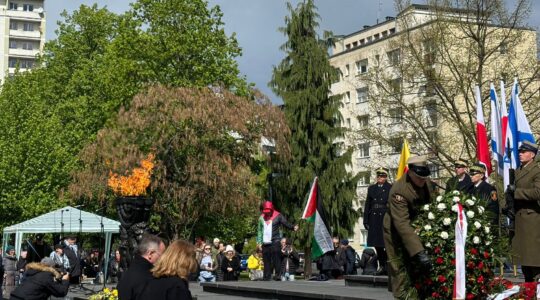PARIS (JTA) – Baron Guy de Rothschild, the patriarch of the French branch of the famed Rothschild banking empire, was a secular Jew but well understood the needs of the Jewish community. He founded the United Jewish Fund and presided over it for more than three decades.Rothschild died June 14 in Paris, his family announced. He was 98. The cause of death was not given.He founded the fund, a federation of some 200 social, educational and cultural associations, in 1950 and guided it until 1982.”The baron played a major leadership role in the French Jewish community even though he did not have any official role in the past 30 years,” said David Saada, the fund’s general director.Rothschild’s son David assumed its leadership in 1982. David Rothschild transferred the reins last year to Pierre Besnainou, also the head of the European Jewish Congress. Besnainou was unavailable for comment.Saada noted that Baron Rothschild valued a role for religion in the field of education, especially among Sephardim.”He signed a very important accord with the Jewish Agency in the 1970s that reoriented and boosted Jewish education in France,” Saada said. “I had dealings with him going back 25 years. He was not at all religious, but his force was that he understood the needs of the community in that area.”The United Jewish Fund helped to restructure the community after the deportation of 75,000 French Jews by the collaborationist French government during World War II, and played a major role integrating the Sephardim who came from Morocco, Tunisia and Algeria in the 1950s and ’60s, and now account for at least 70 percent of the approximately 700,000 Jews in France.While he worked on Jewish education in France, his focus in Israel was secular.”The baron helped Israel enormously directly and indirectly,” said Yossi Haklai, director of the education department of the Jewish Agency in Paris.Haklai said Rothschild was responsible for a number of foundations there, notably the Keren Caesarea, which focused on secular culture and education programs.”In his later years he did not go often to Israel, but he was well known there and his death was noted in the Israeli press,” Haklai said.The French government during the Nazi occupation seized the Rothschilds’ financial empire because the family was Jewish. Rothschild fled to the United States and then London, where he joined the resistance force led by Gen. Charles de Gaulle.Rothschild rebuilt the empire following World War II and guided de Rothschild Freres bank from 1967 to 1979. In 1981, the bank was again taken away, this time nationalized by the French government under Socialist President Francois Mitterrand. A bitter Rothschild wrote after the seizure, “A Jew under Petain, a pariah under Mitterrand – for me it’s enough.”A few years later, his son David once more began to piece together the family banking network, which in 1987 became the Rothschild and Company Bank.In his later years, Baron Rothschild’s main interest was horse racing. He had inherited a stable in Normandy from his father, where he produced many pure-blood champions and won major European derbies. He was president of the French union of Pureblood Horsebreeders for seven years.Rothschild and his second wife, Marie Helene, were stars on the French high society scene, Jewish and non-Jewish, Saada said.Saada said Rothschild’s first wife, Alix Schey de Koromla, was active in Jewish causes.Along with David, Rothschild is survived by another son, Edouard.A funeral service was planned for June 21 in Paris’ main synagogue.





